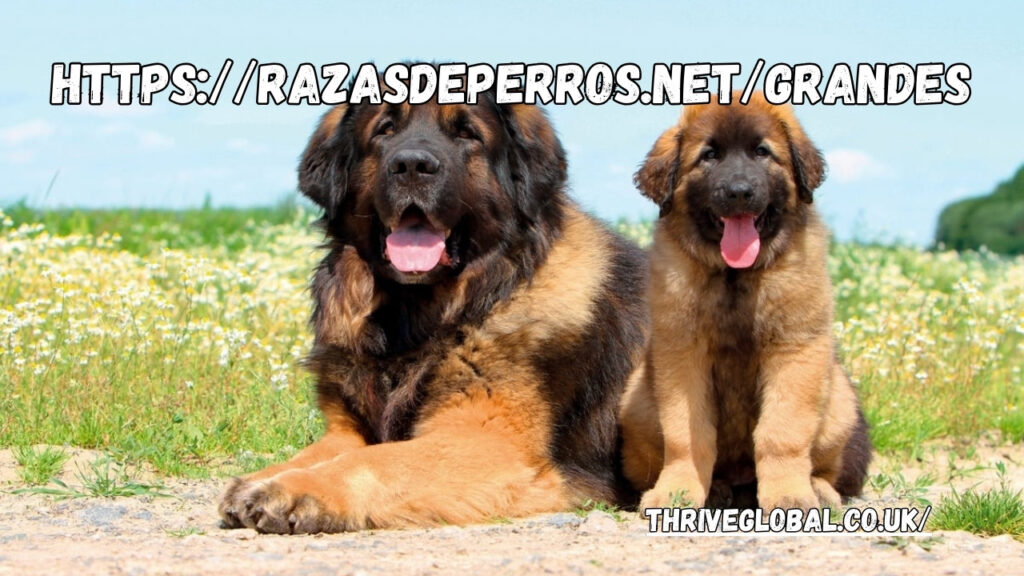introduction to https://razasdeperros.net/grandes
Large dog breeds, known for their majestic size and often gentle demeanor, offer unique companionship and loyalty. This guide explores various aspects of large dog breeds, from their characteristics and care needs to why they make excellent pets. https://razasdeperros.net/grandes
What Defines a Large Dog?
Large dogs typically weigh between 60 to 100 pounds or more and stand over 24 inches tall at the shoulder. Their size often reflects their strength and presence, making them popular among families and individuals looking for a sturdy and reliable companion.
Benefits of Owning a Large Dog
Impressive Companionship
Large dogs often have a calm and gentle nature, making them excellent companions. They are known for their loyalty and protective instincts, which can provide a sense of security.
Active Lifestyle
Many large dog breeds thrive on physical activity. They make great partners for outdoor adventures, including hiking, jogging, and other high-energy activities.
Popular Large Dog Breeds
German Shepherd
German Shepherds are known for their intelligence, versatility, and loyalty. They excel in various roles, from family pets to service and police dogs.
Golden Retriever
Golden Retrievers are friendly, tolerant, and eager to please. Their gentle nature makes them great family pets, and they are also popular as therapy and service dogs.
Rottweiler
Rottweilers are robust and powerful dogs known for their courage and confidence. They are highly protective of their families and can be excellent guard dogs.
Care and Maintenance of Large Dogs
Exercise Needs
Large dogs generally require significant exercise to maintain their physical and mental health. Daily walks, playtime, and structured activities like agility or obedience training are essential.
Diet and Nutrition
Proper nutrition is crucial for large dogs. They need a balanced diet rich in proteins, fats, and essential nutrients to support their size and energy levels. Consulting with a veterinarian for specific dietary recommendations is advisable.
Grooming Requirements
Grooming needs vary among large dog breeds. For example, Golden Retrievers require regular brushing to manage their long fur, while breeds like the German Shepherd need frequent grooming to control shedding.
Health Considerations for Large Dogs
Common Health Issues
Large dog breeds can be prone to specific health issues, such as hip dysplasia, arthritis, and heart conditions. Regular veterinary check-ups and preventative care are vital to manage and prevent these conditions.
Lifespan Expectations
The lifespan of large dogs tends to be shorter than that of smaller breeds, typically ranging from 8 to 12 years. Providing a balanced diet, regular exercise, and routine veterinary care can help extend their lifespan.
Training Tips for Large Dogs
Basic Obedience
Training large dogs should start with basic obedience commands like sit, stay, and come. Consistency and positive reinforcement are key to successful training.
Advanced Training
Advanced training can benefit large dogs by providing mental stimulation and reinforcing good behavior. Activities like agility training, search and rescue, and advanced obedience are excellent options.
Socialization and Behavior
Early Socialization
Early socialization is critical for large dogs to develop into well-adjusted adults. Exposing them to different environments, people, and animals helps build confidence and prevents behavioral issues.
Managing Behavioral Issues
Large dogs can develop behavioral problems if not properly trained or exercised. Common issues include excessive barking, chewing, and aggression. Early intervention and consistent training are essential.
Family-Friendly Large Dog Breeds
Labrador Retriever
Labrador Retrievers are known for their friendly and outgoing nature. They are excellent with children and other pets, making them ideal family dogs.
Bernese Mountain Dog
Bernese Mountain Dogs are gentle giants with a calm and affectionate temperament. They are great with kids and thrive in family environments.
Newfoundland
Newfoundlands are known for their gentle and patient nature. They are excellent swimmers and have a natural affinity for water, making them great companions for families who enjoy outdoor activities.
Large Dogs and Living Spaces
Apartment Living
While large dogs can adapt to apartment living, it requires commitment to providing adequate exercise and mental stimulation. Breeds like the Great Dane and Mastiff can do well in apartments if their exercise needs are met.
Homes with Yards
Large dogs often thrive in homes with yards where they can move freely and play. Breeds like the Golden Retriever and German Shepherd particularly enjoy having space to run and explore. https://razasdeperros.net/grandes
Travel and Large Dogs
Car Travel
Large dogs can be good travelers with the right preparation. Ensuring they are safely secured in the car, using a harness or crate, and making frequent stops for exercise and bathroom breaks are important.
Air Travel
Air travel with large dogs can be more challenging due to their size. They typically need to travel in the cargo hold, and it’s important to check airline regulations and ensure their comfort and safety during the flight. https://razasdeperros.net/grandes
Choosing the Right Large Dog Breed
Lifestyle Compatibility
Selecting the right large dog breed depends on your lifestyle and activity level. Active individuals might prefer breeds like the German Shepherd, while those looking for a more relaxed companion might opt for a Great Dane.
Allergies and Sensitivities
If allergies are a concern, consider breeds known for being hypoallergenic. While no dog is completely hypoallergenic, breeds like the Giant Schnauzer and Poodle mixes tend to produce fewer allergens. https://razasdeperros.net/grandes
The Adoption Process for Large Dogs
Finding a Reputable Breeder
If purchasing from a breeder, ensure they are reputable and follow ethical breeding practices. Look for breeders who provide health clearances and allow you to meet the puppies and their parents.
Adopting from a Shelter
Adopting a large dog from a shelter is a wonderful option. Many shelters have large breeds looking for loving homes. Adoption helps reduce the number of homeless animals and can be a rewarding experience. https://razasdeperros.net/grandes
Large Dogs in Different Climates
Cold Climates
Large breeds like the Saint Bernard and Alaskan Malamute are well-suited for cold climates due to their thick coats. However, they still need proper shelter and care during extreme weather.
Warm Climates
Breeds like the Labrador Retriever and Boxer can do well in warmer climates. Ensure they have plenty of water, shade, and avoid strenuous activities during the hottest parts of the day.
Understanding the Temperament of Large Dogs
Breed-Specific Traits
Each large breed has unique temperament traits. Understanding these traits can help you choose a breed that fits well with your family and lifestyle. For example, Great Danes are known for their gentle nature, while Rottweilers are confident and protective. https://razasdeperros.net/grandes
Individual Personality
Individual dogs within a breed can have different personalities. Meeting and spending time with a dog before bringing them home can help ensure a good match.
The Role of Large Dogs in Therapy and Service
Therapy Dogs
Large breeds like Golden Retrievers and Labradors are commonly used as therapy dogs due to their calm and gentle nature. They provide comfort and support to those in need.
Service Dogs
Many large breeds are trained as service dogs. They assist individuals with disabilities by performing tasks such as retrieving items, providing stability, and alerting to medical conditions. https://razasdeperros.net/grandes
Cost Considerations for Large Dogs
Initial Costs
The initial cost of acquiring a large dog can vary widely. Purebred puppies from reputable breeders can be expensive, while adoption fees from shelters are typically lower.
Ongoing Expenses
Owning a large dog involves ongoing costs such as food, grooming, veterinary care, and pet insurance. Budgeting for these expenses is important to ensure you can provide for your dog’s needs.
Integrating Large Dogs into Your Home
Preparing Your Home
Before bringing a large dog home, prepare your living space. Ensure you have all necessary supplies such as a bed, food and water bowls, toys, and grooming tools.
Introducing to Other Pets
If you have other pets, introduce them to your new dog gradually. Supervised introductions in a neutral area can help prevent territorial behavior and ensure a smooth transition. https://razasdeperros.net/grandes
Exercise Ideas for Large Dogs
Daily Walks
Daily walks are essential for large dogs to burn off energy and stay healthy. Aim for at least 30 to 60 minutes of walking each day.
Interactive Play
Interactive play sessions, such as fetch or tug-of-war, are great ways to engage your dog mentally and physically. Toys that challenge their mind, like puzzle toys, are also beneficial. https://razasdeperros.net/grandes
Dog Sports
Many large dogs excel in dog sports such as agility, obedience, and flyball. These activities provide excellent physical and mental stimulation.
Ensuring the Well-Being of Large Dogs
Regular Veterinary Care
Routine veterinary visits are crucial for maintaining your dog’s health. Regular check-ups, vaccinations, and preventative treatments help ensure your dog stays healthy.
Mental Stimulation
Large dogs need mental stimulation to prevent boredom and behavioral issues. Training, interactive toys, and new experiences can keep their minds sharp.
Conclusion
Large dog breeds bring a unique blend of companionship, loyalty, and presence. By understanding their needs and characteristics, you can find the perfect large dog to fit your lifestyle and provide a loving home. Whether you’re looking for an active partner or a gentle giant, there’s a large breed out there for you. https://razasdeperros.net/grandes
FAQs
What are some good large dog breeds for families?
Breeds like the Labrador Retriever, Golden Retriever, and Bernese Mountain Dog are excellent choices for families due to their friendly and tolerant nature.
Do large dogs require a lot of exercise?
Yes, large dogs generally require significant exercise to maintain their physical and mental health. Breeds like the German Shepherd and Golden Retriever need regular physical activity.
Are large dogs suitable for apartment living?
While challenging, some large dogs can adapt to apartment living if they receive adequate exercise and mental stimulation. Breeds like the Great Dane and Mastiff are known to do well in apartments.
What are some common health issues in large dogs?
Common health issues include hip dysplasia, arthritis, and heart conditions. Regular veterinary care can help manage these conditions.
How can I train my large dog?
Start with basic obedience training and use positive reinforcement techniques. For more advanced training, consider enrolling in dog sports or hiring a professional trainer.
What is the lifespan of large dogs?
The average lifespan of large dogs ranges from 8 to 12 years, depending on the breed and overall health.



